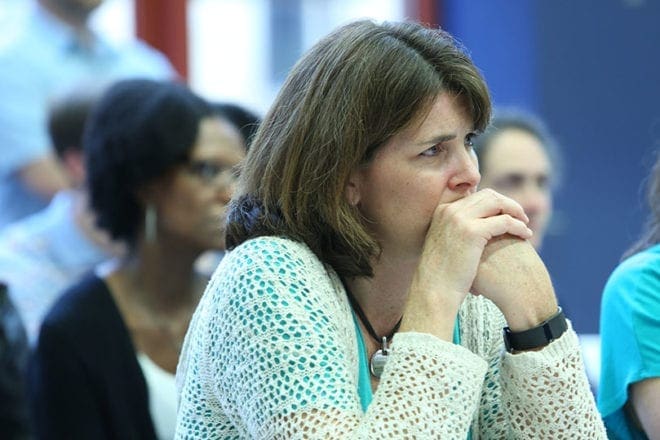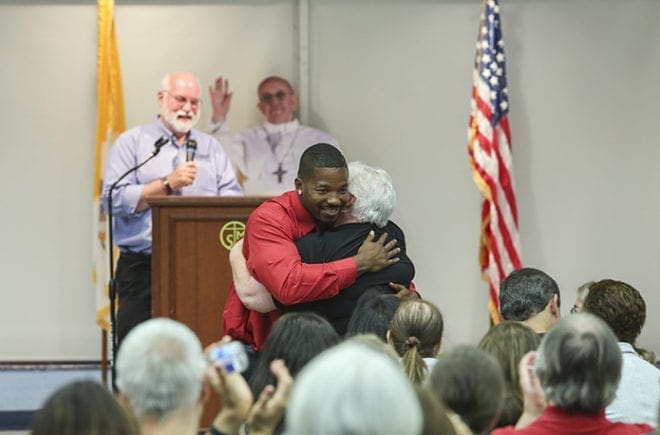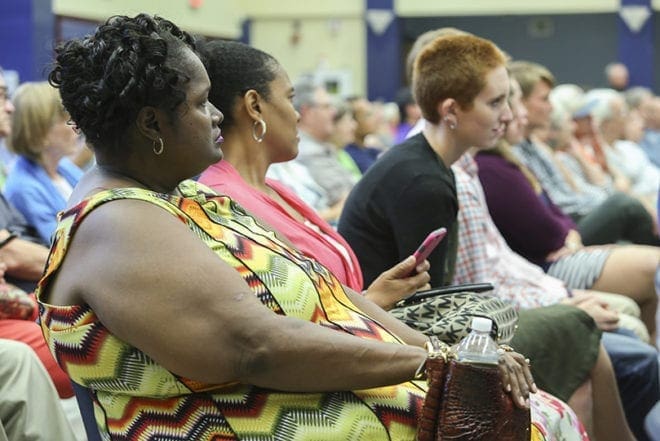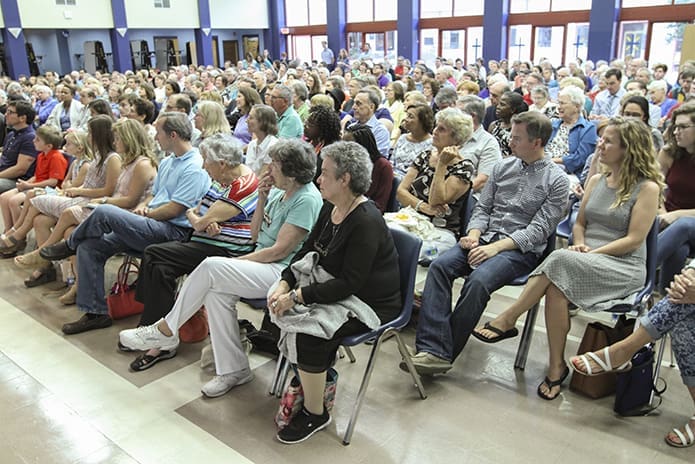Following the Aug. 21 evening Mass at St. Thomas More Church, Decatur, (counter-clockwise, from left) Jesuit Father Gregory Boyle returns Jillian Madden’s copy of his book, “Tattoos on the Heart,” to her after signing it. Looking on are her friends Nicholas Arjona and Julianne Green. Madden and Green served as Jesuit volunteers in Atlanta from 2013-2014. Photo By Michael Alexander
Decatur
‘No kinship, no peace,’ says Jesuit who started industries for ex-gang members
By NICHOLE GOLDEN, Staff Writer | Published September 22, 2016
DECATUR—Former gang member Michael Jenkins was serving his second prison sentence for robbery in California when he decided things had to change.
Seven months into a training program at Homeboy Industries in Los Angeles, Jenkins’ life is on track. He is working as a firefighter, having gang tattoos removed, and striving to be a better father.
Jenkins shared his progress with parishioners of St. Thomas More Church in Decatur Aug. 21, accompanying the creator of Homeboy Industries, Jesuit Father Greg Boyle.
Father Boyle celebrated the 5:30 p.m. Mass and spoke afterward in Mulhern Hall about the gang rehabilitation program he founded over 20 years ago.
Trainee Jenkins, 29, told his story of growing up in Compton, California, as an introduction to Father Boyle and his work.
“I was born addicted to cocaine,” he said.
Jenkins never met his grandparents and had no relationship with his father.
“I just felt I didn’t have love. I reached out to a gang when I was 11,” said Jenkins. “It was negative attention, but I didn’t know that,” he said.
With a second strike against him and his jail term drawing to a close, Jenkins was tired and got down on his knees to pray.
“I asked God to help me,” he said. “I never thought I’d change my life.”

Mary Beyer of St. Thomas More Church, Decatur, listens as Father Greg Boyle and former gang member Michael Jenkins share personal stories of gang life and gang prevention in the city of Los Angeles, Calif. Photo By Michael Alexander
He learned about Homeboy Industries through a parole officer.
Jenkins is spending more time with his 7-year old twins, a son and daughter.
“I’m just now getting back into their lives,” he said.
Jenkins said the children enjoy seeing his firefighting gear.
“You guys being here today is part of my healing process,” he told attendees.
As Father Boyle came on stage, Jenkins said, “This man has changed my life.”
Ordained a priest in 1984, Father Boyle served as pastor of Dolores Mission Church, the poorest parish in Los Angeles, from 1986 to 1992. The effort to provide a different future for gang members began in 1988 in the parish.
“We belong to one another”
Now in his 60s, Father Boyle came to Atlanta to speak about the work in parishes and at Ignatius House Retreat Center. Father Boyle suspected the community turned out for his talk because they long for the world to look different than it does.
“The vision still has its time, and it presses on to fulfillment; and it will not disappoint. And if it delays, wait for it,” said Father Boyle, reading the words of the prophet Habakkuk.
We are all invited, said the priest, to stand with others who are burdened, with the demonized and the disposable.
“This is our common call because no kinship, no peace,” said Father Boyle. “Mother Teresa diagnosed the world’s ills correctly, I think, when she suggested that the problem in the world is that we’ve just forgotten we belong to one another.”
Father Boyle shared the humor and heartbreak of the work. Running an $18 million nonprofit operation with former gang members provides plenty of comedic material. The funny things that happen often indicate great truths, said the priest.
Father Boyle calls the former gang members “homies” and said they sometimes mangle the English language in the style of Yogi Berra.
At a juvenile hall Mass, with hundreds in attendance, he sat back to listen to the homeboys proclaim the word.
As one man began reading, he said confidently, “The Lord is exhausted,” instead of exalted.
“But I remember thinking at the time, ‘Wow, that’s way better’,” said Father Boyle. “A God that exhausts himself in loving us … that’s not bad.”
It’s hard to know just who is the service provider and who is the benefactor, said Father Boyle.
“My life has been changed and my heart has been altered,” he said of the work.
Onetime rival gang members are co-workers at Homeboy Industries and fire jabs by way of texts instead of bullets.
“There’s a word for that; it’s kinship,” said Father Boyle.
We have to arrive at a place of mutuality instead of just providing a service, said the priest.
“We’re all in need of healing. We’re all crying for help,” said Father Boyle. “That’s what joins us together as members of the human family.”
Put hair nets on gang members
As pastor of Dolores Mission, Father Boyle quizzed offenders in the neighborhood about returning to school. All said if a school would accept them, they would go.
No school would take the youth, so the priest started one. He asked the nuns of the parochial school if they would give up the third floor of the convent for an alternative school. They readily agreed.
“It was as simple as that,” said Father Boyle. “Where would we be without nuns?”
The priest and women of the parish knocked on business doors to find felon-friendly employers. Because it was tough to find willing employers, they invented job crews for graffiti removal, grounds keeping, and one that constructed a childcare center. The Jobs for the Future program started in 1988.
There were eight gangs at war in those days, and the LAPD said the community had the highest gang concentration in Los Angeles.

Michael Jenkins served time in prison and he actively participated in a gang. With a mother who was addicted to drugs and father who was not around, he said he never received the parental love and affection kids crave. At one point during the questions and comments, a woman in the crowd gives Jenkins a spontaneous hug because, according to Jesuit Father Gregory Boyle, standing at the podium, all people are called to create communities of kinship and love. Photo By Michael Alexander
When riots broke out in 1992, the neighborhood around the mission remained quiet.
“My parish, the projects, didn’t explode,” said Father Boyle. “The L.A. Times wanted to know why.”
He said it was because 60 strategically hired gang members had “a reason to get up in the morning.”
Hollywood producer Ray Stark decided to give to the cause. Father Boyle suggested Stark buy an abandoned bakery with working ovens.
“We could put hair nets on rival gang members,” he said. “And that was the extent of my business plan.”
The success of Homeboy Bakery created the groundwork to start more businesses to employ former gang members. In 2001 Jobs for a Future became Homeboy Industries. Father Boyle is its founder and executive director.
While Homeboy Bakery thrives, not every endeavor worked.
“Let me be the first to say that Homeboy plumbing was not extremely successful. Who knew people didn’t want gang members in their homes? I didn’t see that coming,” said Father Boyle.
Homeboys tell their stories
The volunteers backed their way into the largest gang intervention program, helping thousands refashion their lives.
Homeboy Industries employs and trains former gang members in a range of enterprises and provides social services to more than 10,000 people annually. Father Boyle wrote the New York Times bestseller, “Tattoos on the Heart: The Power of Boundless Compassion.” He is the subject of a 2012 documentary, “G-Dog.”
The trainees work in solar panel installation, silkscreen printing, merchandise marketing, operate a diner at City Hall, fight wildfires and sell groceries.
At Homegirl Café, waitresses with an attitude interact with customers, including celebrity patrons.
“It’s exactly what God had in mind,” said Father Boyle.
The centerpiece is an 18-month training program with various phases. Components are GED classes and educational workshops, apprenticeships, therapy, including anger management, and free tattoo removal. A paid physician’s assistant and volunteer doctors make the removal program possible.
Criteria for participation by serious offenders are a referral, a desire to want to change, passing drug tests, and former gang involvement.
When Father Boyle makes presentations, he usually takes two homies with him to tell their stories.
One man, José, spoke to 600 social workers in Virginia. He told them when he was 6 his mother suggested he kill himself. They collectively gasped.
José’s mom abandoned him at an orphanage, claiming she found him. His grandmother rescued him, but he later suffered abuse from his mother. His habit of wearing three layers of shirts to hide wounds extended to adulthood.
Father Boyle recounted José’s words, “Now I welcome my wounds. My wounds are my friends. After all, how can I help heal the wounded, if I don’t welcome my own wounds?”
Despising the wounded is an idea rooted in this world, said Father Boyle.
“Make your mother proud”
Homeboy Mario was petrified at his first speaking engagement. The most heavily tattooed, he was also the most gentle, the priest recalled.
When a woman at that program asked what wisdom he imparted to his children, Mario expressed the hope they would not be like him.
She countered with, “You are loving, kind, gentle and wise. I hope your kids turn out to be like you.”
A thousand strangers clapped for a long time, and Mario held his face in his hands, recalled Father Boyle.
“A room of strangers had returned him to himself and they were returned to themselves,” he said.
Father Boyle and Jenkins took questions from the audience.
One woman asked if she could give Jenkins a hug and praised his courage.
“You have to want to change,” he told the group.

Marilyn Crosby of St. John the Evangelist Church, Gulfport, Miss., Lesley Guyot of Our Lady of Lourdes Church, Atlanta, and Alyssa Crowley of Los Angeles, a 2016-2017 Atlanta Jesuit volunteer, are on hand for the presentation about Homeboy Industries, a Los Angeles based gang prevention and job training program for former gang members. Photo By Michael Alexander
Now he devotes time to listening to his children.
“We work on the emotional work. Without working on the emotional side, you’ll be nowhere,” he said.
Joe Brewster, 11, asked Jenkins if he’d ever been involved in shootings.
Jenkins told the sixth-grader that he had stolen cars in carjackings and been shot at.
“Bullets move fast. That’s not the kind of life I want to live,” he said. “Stay in school and make your mother proud.”
Several stood in line to meet the priest and Jenkins afterward.
St. Thomas More parishioner Tammy Davis read “Tattoos on the Heart” in April.
She was moved by the ideas on kinship, “which is a pretty strong theme in his book.”
Another woman asked Father Boyle how to remain centered on God in service work.
“If you’re depleted, you’re doing it all wrong,” said Father Boyle.
The key is to stay anchored in the present.
Father Boyle dismisses the notion that he is a healer. It’s the other way around, he said.
“I think saving lives is for the Coast Guard,” he said. “My life is saved every day.”
